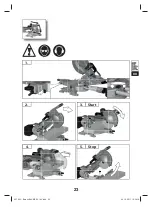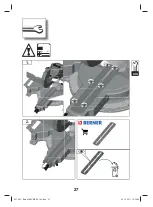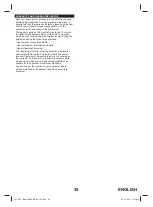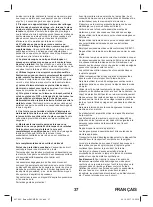
32
TECHNICAL DATA
MITRESAW
BACMS BL 18V
Code
BACMS BL 18V 01 00001-99999
No-load speed
4000 min
-1
Battery voltage
18 V
Saw blade dia. x hole dia
254 x 30 mm
Saw blade body thickness max.
Saw blade tooth thickness min.
2 mm
2,8 mm
Cutting width max.
Mitre 0°/ Bevel 0°
Mitre 45°/ Bevel 0°
Mitre 0°/ Bevel 45°
Mitre 45°/ Bevel 45°
91 x 289 mm
91 x 205 mm
51 x 289 mm
51 x 205 mm
Weight according EPTA-Procedure 01/2003 (1,5/2,0 Ah)
Weight according EPTA-Procedure 01/2003 (3.0/4.0/5.0 Ah)
Weight according EPTA-Procedure 01/2003 (9.0 Ah)
19,7 kg
20,0 kg
20,4 kg
Noise information
Measured values determined according to EN 62841. Typically, the A-weighted noise levels of the tool are:
Sound pressure level (Uncertainty K=3dB(A))
Sound power level (Uncertainty K=3dB(A))
Wear ear protectors!
90,5 db(A)
101,5 db (A)
WARNING Read all safety warnings, instructions,
illustrations and specifi cations provided with this
device.
Failure to follow the warnings and instructions may
result in electric shock, fi re and/or serious injury.
Save all warnings and instructions for future reference.
SAFETY INSTRUCTIONS FOR MITRE SAWS
a) Mitre saws are intended to cut wood or wood-like
products, they cannot be used with abrasive cut-off
wheels for cutting ferrous material such as bars, rods,
studs, etc.
Abrasive dust causes moving parts such as the
lower guard to jam. Sparks from abrasive cutting will burn
the lower guard, the kerf insert and other plastic parts.
b) Use clamps to support the workpiece whenever
possible. If supporting the workpiece by hand, you
must always keep your hand at least 100 mm from
either side of the saw blade. Do not use this saw to cut
pieces that are too small to be securely clamped or held
by hand.
If your hand is placed too close to the saw blade,
there is an increased risk of injury from blade contact.
c) The workpiece must be stationary and clamped or
held against both the fence and the table. Do not feed
the workpiece into the blade or cut “freehand” in any
way.
Unrestrained or moving workpieces could be thrown at
high speeds, causing injury.
d) Push the saw through the workpiece. Do not pull the
saw through the workpiece. To make a cut, raise the
saw head and pull it out over the workpiece without
cutting, start the motor, press the saw head down and
push the saw through the workpiece.
Cutting on the pull
stroke is likely to cause the saw blade to climb on top of the
workpiece and violently throw the blade assembly towards
the operator.
e) Never cross your hand over the intended line of
cutting either in front or behind the saw blade.
Supporting the workpiece “cross handed” i.e. holding the
workpiece to the right of the saw blade with your left hand or
vice versa is very dangerous.
f) Do not reach behind the fence with either hand closer
than 100 mm from either side of the saw blade, to
remove wood scraps, or for any other reason while the
blade is spinning.
The proximity of the spinning saw blade
to your hand may not be obvious and you may be seriously
injured.
g) Inspect your workpiece before cutting. If the
workpiece is bowed or warped, clamp it with the outside
bowed face toward the fence. Always make certain that
there is no gap between the workpiece, fence and table
along the line of the cut.
Bent or warped workpieces can
twist or shift and may cause binding on the spinning saw
blade while cutting. There should be no nails or foreign
objects in the workpiece.
h) Do not use the saw until the table is clear of all tools,
wood scraps, etc., except for the workpiece.
Small debris
or loose pieces of wood or other objects that contact the
revolving blade can be thrown with high speed.
i) Cut only one workpiece at a time.
Stacked multiple
workpieces cannot be adequately clamped or braced and
may bind on the blade or shift during cutting.
j) Ensure the mitre saw is mounted or placed on a level,
fi rm work surface before use.
A level and fi rm work
surface reduces the risk of the mitre saw becoming
unstable.
k) Plan your work. Every time you change the bevel or
mitre angle setting, make sure the adjustable fence is
set correctly to support the workpiece and will not
interfere with the blade or the guarding system.
Without
turning the tool “ON” and with no workpiece on the table,
move the saw blade through a complete simulated cut to
assure there will be no interference or danger of cutting the
fence.
l) Provide adequate support such as table extensions,
saw horses, etc. for a workpiece that is wider or longer
than the table top.
Workpieces longer or wider than the
mitre saw table can tip if not securely supported. If the
cut-off piece or workpiece tips, it can lift the lower guard or
be thrown by the spinning blade.
m) Do not use another person as a substitute for a
table extension or as additional support.
Unstable
support for the workpiece can cause the blade to bind or the
ENGLISH
457 063 - Berner-BACMS BL 18V.indd 32
457 063 - Berner-BACMS BL 18V.indd 32
04.10.2017 15:35:11
04.10.2017 15:35:11
















































